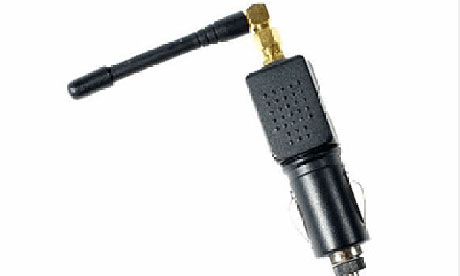A typical GPS jammer can create a 500-metre bubble around any vehicle. '
People are using these because they don't want to be detected,' says one expert
People are using these because they don't want to be detected,' says one expert
Thousands of people in the UK are using "GPS jammers" that plug into car cigarette lighters and can stop tracking systems used to detect stolen cars, monitor vehicle use or stop drivers working overlong hours, according to new findings from experts.
That could lead to the danger of overtired lorry drivers staying on the roads despite the presence of monitoring equipment.
And could also pose a threat if vehicles equipped with the jammers were to go on to airport areas near aircraft which rely on GPS (global positioning system) for navigation.
And could also pose a threat if vehicles equipped with the jammers were to go on to airport areas near aircraft which rely on GPS (global positioning system) for navigation.
Yet despite the risks posed by the devices – which are sold over the internet – it is not illegal to import, sell, buy or possess them.
It is an offence only under the Wireless Telegraphy Act to "knowingly use" such a device to block GPS signals.
Though the communications regulator Ofcom is looking to close some of the loopholes.
It is an offence only under the Wireless Telegraphy Act to "knowingly use" such a device to block GPS signals.
Though the communications regulator Ofcom is looking to close some of the loopholes.
The growing use of the devices could also torpedo any plans to introduce "pay as you drive" insurance or road toll systems if the vehicle owner was able to block communications with monitoring systems.
When people use these, it creates a bubble around their vehicle for about 500 metres that jams any GPS receiver or transmitter," Prof Charles Curry of Chronos Technology told the Guardian.
It stops any tracking system the owner might have put on the car.
Usually they will block GSM [mobile phone] signals too that might also be used to send back a location.
It stops any tracking system the owner might have put on the car.
Usually they will block GSM [mobile phone] signals too that might also be used to send back a location.
It means that for anyone trying to track the vehicle, it just vanishes off the map.
It's as though it were in an underground car park.
It's as though it were in an underground car park.
Police have already seized one jammer that was being used by a van driver following tests by the team, who have built a system that can detect the disruption caused by the jammers.
Bob Cockshott, of the ICT Knowledge Transfer Network, said: "People are using these because they don't want to be detected.
Bob Cockshott, of the ICT Knowledge Transfer Network, said: "People are using these because they don't want to be detected.
It's very easy to drown out the signal from a GPS satellite – which at ground level puts out as much power as a 20-watt light bulb 12,000 miles away.
When engineers began monitoring traffic on a dual carriageway outside London, and compared it with traffic on roads inside the City of London, they discovered regular use of jammers, with 10 incidents per day by some roads.
That would translate to thousands of users around the country, given the amount of traffic on the road.
That would translate to thousands of users around the country, given the amount of traffic on the road.
It may be truck drivers making deliveries outside hours.
Or taxi drivers who are working for a company and want to keep all the payments for themselves rather than splitting it with the cab owner.
Or taxi drivers who are working for a company and want to keep all the payments for themselves rather than splitting it with the cab owner.
But Curry and Cockshott said that the use of jammers carried broader risks, not just from overtired drivers.
They could affect aircraft navigation systems, and for drivers in the immediate area they could mess up their GPS reception because these wipe out those signals.
They could affect aircraft navigation systems, and for drivers in the immediate area they could mess up their GPS reception because these wipe out those signals.
In fact one online review of a jammer by a user included the complaint that their GPS didn't work when it was active.
However the availability of such jammers pales in comparison to the Russian-built ones deployed by North Korea.
Which are reputedly able to affect systems as much as 100km away.
And which were used in May 2012 to scramble GPS signals near two of South Korea's major airports.
Charles Arthur
Which are reputedly able to affect systems as much as 100km away.
And which were used in May 2012 to scramble GPS signals near two of South Korea's major airports.
Charles Arthur


.jpg)
No comments:
Post a Comment